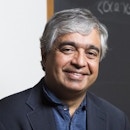- Speaker
-
 Subir Sachdev, Ph.D.Herchel Smith Professor of Physics, Harvard University
Subir Sachdev, Ph.D.Herchel Smith Professor of Physics, Harvard University
Presidential Lectures are a series of free public colloquia spotlighting groundbreaking research across four themes: neuroscience and autism science, physics, biology, and mathematics and computer science. These curated, high-level scientific talks feature leading scientists and mathematicians and are designed to foster discussion and drive discovery within the New York City research community. We invite those interested in these topics to join us for this weekly lecture series.
The strangest feature of quantum theory was dubbed “spooky action at a distance” by Albert Einstein. Today, scientists have convincing evidence that two quantum particles far apart can entangle with each other such that the observation of one can instantaneously determine the state of the other.
In this lecture, Subir Sachdev will describe how this quantum feature is playing a central role in many modern developments in physics. Quantum entanglement can occur on a macroscopic scale with trillions of electrons, leading to new forms of ‘ultra-quantum matter’ with properties of technological importance. In high-temperature superconductors, such as YBa2Cu3O7, there appears to be a ‘quantum critical point’ whose entanglement structure is being explored by experiment and theory. Related entanglement structures arise across black hole horizons, and recent advances have shed new light on Stephen Hawking’s information paradox. Sachdev will use simple models of entanglement to describe these mutually beneficial developments across different fields of physics.
